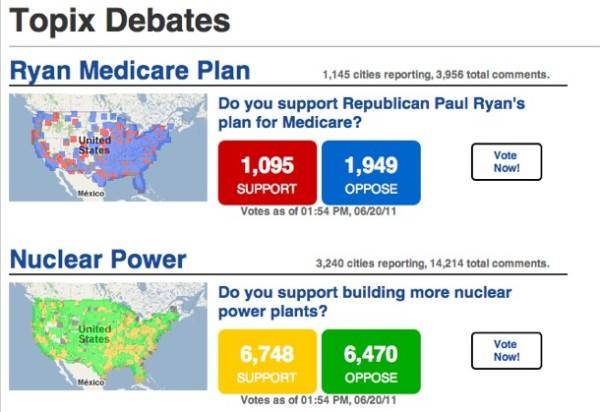Contrary to the beliefs of some Internet entrepreneurs, local news and advertising is not dying. If advertising professionals can be believed, targeted local advertising is one of their primary goals, with the market expected to grow to $35 billion by 2014.

Local news aggregator Topix held a “State of Local Online Advertising” survey with some of the top U.S. advertising agencies. The survey shows that 60% of advertisers believe geo-targeted ads deliver stronger return on investment, with 33% of advertisers seeing double-digit gains. In an interview, Topix CEO Chris Tolles said advertisers and publishers do not need to be “hyperlocal” to make money in local markets.
Tolles: Topix is Bigger than Mahalo
At the ReadWriteWeb 2Way Summit last week, publisher and serial entrepreneur Jason Calacanis blasted local news saying “no one gives a s**t about local.”
Tolles would disagree. He sited a FCC report that recently said that there are not enough page views in local news and said that it was not local consumers who are the problem, but rather the journalists.
“An FCC report came out recently that said ‘wow, there is not enough traffic to local news sites.’ I think people are interested in local news and I think the people who are not interested in local news are journalists,” Tolles said. “The people who do not (have an interest in) local news are journalists. They are the problem, they are not the answer. The opportunity is to change the journalists’ minds about local news because there is a hierarchy of news reporting that no one talks about. Everybody wants to have the pyramid of news end at the White House. I say, invert the pyramid of news so that the highest calling is to do local news and the PTA meeting. Some guy at Gawker said once ‘America needs you to cover all the news that I don’t want to.'”
Tolles said this is where he fundamentally disagrees with Calacanis.
“Let me point out that our site is bigger than his site,” Tolles said with a smile (he was very particular on making sure to be quoted with a smile). “I won’t comment on his aspirations but to say no one cares about local? Yeah, except for the 100 billion or 150 billion dollar ad market that is out there and the fact that newspapers have been the largest way to make wealth in the media for quite a while until the dissemination of the Internet happened.”
The Town As the Contextual Advertising Unit
Traffic to Topix truly comes from the local level. Tolles said that he gets “more traffic from Utica, New York than he gets from New York City” and that in some towns of 5,000 to 10,000 people he is getting upwards of 100,000 page views. The trick, Tolles says, is to start conversations around “sticky” topics, like politics. The more controversial, the better.
As such, Topix will be making a big move into the political sphere on the local level for the 2012 general elections. Advertising revenue is always on an upswing in presidential election years and Tolles is smart to take advantage of the localized aspect of that, creating political heat maps for certain types of debates across the country.

CPM Works for Topix, Will Not Work for Small Local Publishers
“What we noticed is that the localizable unit is the town,” Tolles said. “We notice most of our traffic from small to medium-sized towns. In that way you don’t really need to segment zip code. For instance, if you are in Colesville, Maryland … we can get to Colesville We have a news page about them and it is contextually relevant to Colesville.”
Local is a tricky market when it comes to advertising. Topix can function on a CPM (cost per thousand impressions) basis because it can target ad inventory on a state or county level. Yet, small local publishers cannot make money on CPM because on a localized basis, there are just not enough page views (there are other revenue models, such as sponsorship and local deals).
“We use all parts of the dollar at Topix,” Tolles said. “We do whatever works. There are definitely CPM issues with a small site. It is very hard to get there through a page view point. People like Groupon and Foursquare are exposing different ways to do local advertising.”










